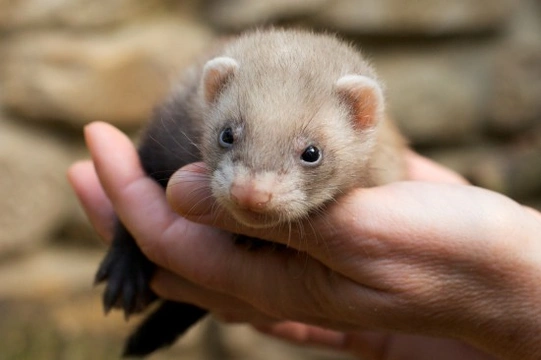
Coughing in Ferrets - Should You Be Worried?
Ferrets are lovely little creatures and they are great fun to have around especially when kept as indoor pets. Although they do sleep most of the day, it's at night that they become so entertaining with their silly antics and playfulness. However, ferrets need to be well socialised from a very young age for them to trust people otherwise they tend to be a bit nippy"". With this said it is possible to overcome this type of behaviour in an older ferret as long as you have the patience to spend as much time as you can with them.
Ferrets like many pets tend to suffer from certain health issues which can be quite worrying. One of which is a constant cough which can be triggered by something in their environment or it could be a symptom of another more serious underlying health issue.
Symptoms to Watch Out For
If you notice that your ferret is not behaving quite as they normally do and that they are coughing a little too often, there could be something else going on which would need investigating. Signs there may be a respiratory issue are as follows:
- Sneezing
- Noisy breathing
- Throatiness
- Coughing up mucus that sometimes contains a little blood in it
Ferrets with any of the above symptoms should be examined by a qualified vet so a correct diagnosis can be made of their condition followed by the right kind of treatment. There are many reasons and causes for ferrets to develop a cough whether it affects their upper respiratory tract or because they have contracted a viral infection like the flu. However, other causes may include the following:
- Sinusitis
- Inflammation of the tracheal pipe
- Rhinitis
- Pulmonary swelling, tumours, or pneumonia
- Infections of the ear, nose, and throat
- Environmental factors and this includes a dirty living environment
Diagnosing the Problem
If you are at all concerned, you should take your pet to the vet so they can carry out a thorough examination. This will help rule out any other more serious conditions that may be causing the cough. It's really helpful if owners can give as much background history of their pets as possible. This includes when the coughing first started, a ferret's routine and sleeping habits and any noticeable changes to either of these. The more information a vet has available, the easier it would be for them to make a correct diagnosis.
A vet may recommend taking X-rays and doing an ultrasound as these would help establish if there is a cardiovascular disease going on. This would impact a ferret's nasal passage, their sinuses or their lower respiratory tract. Once a correct diagnosis has been established, then and only then, would the vet be able to recommend and prescribe the right treatment to clear up the cough.
Treatments
As mentioned a vet would need to establish the underlying causes of a cough before prescribing a treatment and this is particularly true if the cough is severe. However, vets typically recommend that a ferret be kept in a nice quiet environment and given restricted exercise until the cough has cleared up because too much running around might just aggravate the condition.
The All Important After-care
It's really important to keep in touch with your vet during your pet's treatment so that you can tell them of your ferret's progress and if their cough is getting any better or not. If the cough seems to be getting worse even when your pet is being treated, another visit to the surgery may be in order for the vet to re-examine them. This allows the vet to adjust the treatment, however, you may need to be prepared for a long haul because a long-term treatment may be necessary to keep the coughing in check.
Any medication your vet prescribes has to be given in the exact recommended dosage because some drugs and this includes cough suppressants, are quite dangerous to ferrets if administered in the wrong amounts and which could prove fatal.
Check For Allergies
You may find your ferret is allergic to something in their environment or it could be something they eat that's the root cause of their cough. Again, the vet would need to carry out certain tests to eliminate just what it is in the environment or their diet which is usually carried out by a process of elimination.
Conclusion
Ferrets are gorgeous creatures that can keep you entertained for hours when they are awake. If you are worried about a niggling cough your pet may have developed, the best course of action is to get them to the vet as soon as you can so that a correct diagnosis can be made which can then be followed up with the right treatment. Once the treatment has started, it's really important to keep a close eye on your ferret and to keep them as quiet as you can because too much exercise and activity might just aggravate their condition.
""



